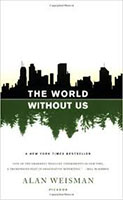 Alan Weisman’s The World Without Us takes a stab at what earth might be like in the far distant future if humans suddenly vanished tomorrow. By envisioning how nature might cope with what we have wrought on earth, Weisman shows us that life will go on without us if it comes to that.
Alan Weisman’s The World Without Us takes a stab at what earth might be like in the far distant future if humans suddenly vanished tomorrow. By envisioning how nature might cope with what we have wrought on earth, Weisman shows us that life will go on without us if it comes to that.
As unlikely as it may seem that humans could suddenly disappear from the earth tomorrow due to a weird virus, religious rapture, or space alien abduction, Weisman asks readers to suspend their disbelief and just go with it. If we can, we have an opportunity to view earth through nature’s lens and perhaps get a few ideas of actions we should take now so that life on earth will continue to include us.
Book Review
The World Without Us is somewhat like an environmental version of A Christmas Carol, by Charles Dickens. Readers, you will travel back in time for a refresher on how humans have been changing the earth since we began walking on it. You will visit places on earth as they are today and glimpse them in the time to come, not just several generations from now, but tens of thousands, and even hundreds of thousands of years in the future.
While reading about some of the exploits of our ancestors, contemplate how our discoveries and actions changed the face of the earth. What part did we play in the extinction of the woolly mammoth and other megafauna? How did our discovery of fire change the landscape? What living things did we transport from continent to continent, knowingly or unknowingly, and how has that impacted life on earth?
Discover how nature would reclaim our houses, offices, freeways, bridges, tunnels, monuments, artwork, and all our worldly goods. Find out what would go first and remain the longest. Visit Varosha, Cyprus, a modern day example of nature taking back an abandoned city.
Feel the hairs rise on the back of your neck as you visualize what would happen at oil refineries, toxic waste dumps, and nuclear power plants if humans were no longer around to monitor, control, and contain them. Learn about what steps today’s humans are taking to communicate the hazards lurking at these locations to who-or-whatever stumbles across them thousands of years from now.
Explore human creations like plastic that are so new no one knows how long they will persist in the environment or if some organism will evolve to eat them. Contemplate the unknown long-term effects of greenhouse gases, spent uranium, heavy metals, toxic chemicals, and hazardous waste.
Yet, there is hope. Learn about places on earth that have undergone horrendous environmental damage and are making a comeback, like Chernobyl and Johnston Atoll. Others, like Kingman Reef, in the middle of the Pacific Ocean, are home to an amazing array of wildlife as well as a mass of human-made detritus. Rare red-crowned cranes and other endangered creatures inhabit a slender, deserted piece of land between South Korea and North Korea, strewn with land mines and enclosed by barbed wire fences.
“I am so amazed by the ability of life to hang on to anything. Given the opportunity, it goes everywhere. A species as creative and arguably intelligent as our own should somehow find a way to achieve a balance. We have a lot to learn, obviously. But I haven’t given up on us.”
—Enric Sala
The Bottom Line
Alan Weisman is an award-winning journalist and author of several books including his latest, Countdown: Our Last, Best Hope for a Future on Earth?
In The World Without Us, Weisman recounts earth’s past and possible future through stories, historical events, and illustrations of what could be. He makes information clear and understandable as well as entertaining and sometimes humorous. It is an easy to read and fascinating book, hard to put down.
I believe it is important for us to look beyond our day-to-day lives, which granted can be all consuming, and remember that we are creating a future not just for the next generation, but far into the future. I recommend The World Without Us to all humans; it is sure to broaden your horizons and get you thinking beyond just tomorrow.
